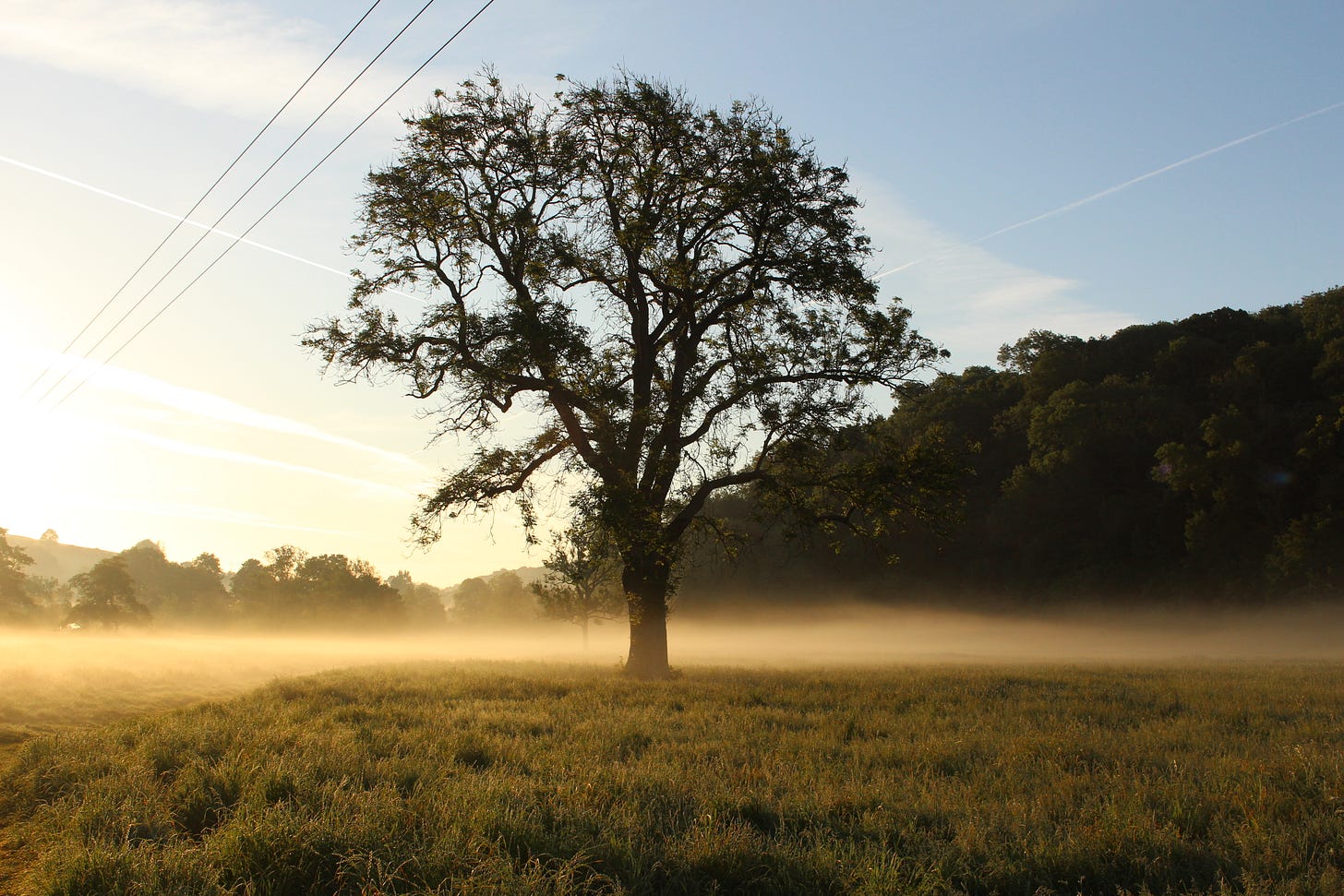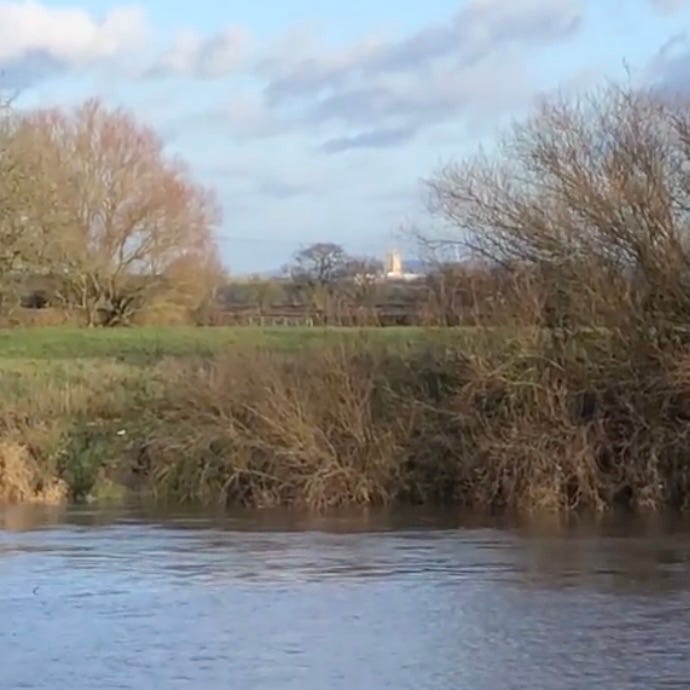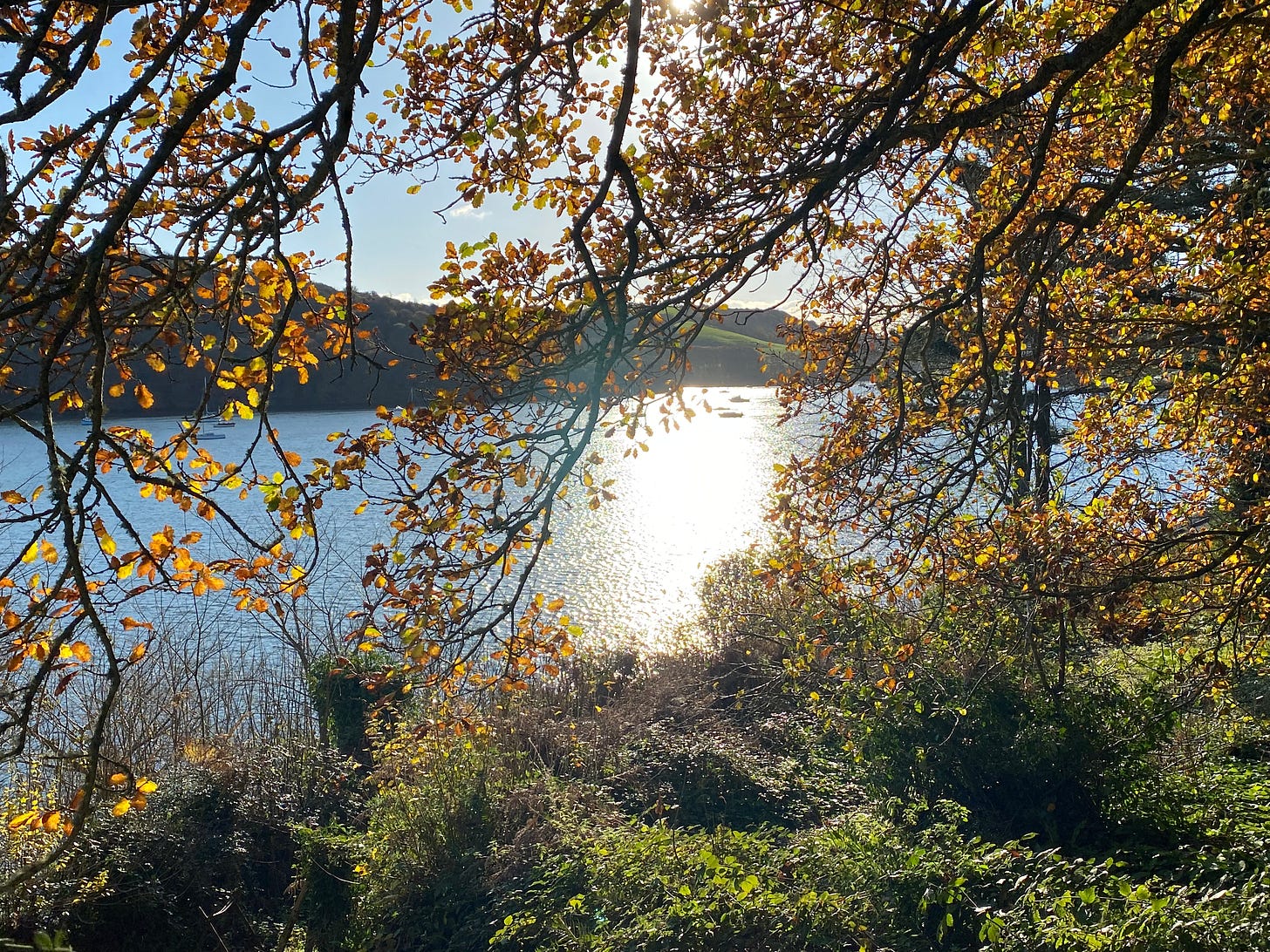Thresholds and Liminality
Themes from co-operative inquiry
This post continues reflections on the themes which arose in the co-operative inquiries into living in a sentient world. In these inquiries, we have been been engaged in an experiential exploration of living cosmos panpsychism, holding the metaphysics up against experiential evidence and narratives of encounter. In this post we explore the strange process of moving between the reality as taken-for-granted in modern society and the world of sentient beings.
For most of the time, inquiry participants, socialized into the dualist Western worldview experience ourselves as centres of subjectivity in a world of objects. All the cues of society orient us in this way. The English language draws us into subject/object discourse; and practically, indeed, we require a subject/object orientation to navigate the everyday world, as for example to drive to and from River along busy roads. As Ľuboš noted while walking softly by his companion Brook:
A few cyclists rush past me in their fancy bright sporting costumes, like some exotic parrots. (It seems to me that the separation of culture from nature, even though misguided conceptually, is repeatedly performed, embodied and thus reinforced in a myriad of such everyday acts.)
Early in the inquiry workshops participants reported that they would sit with River and feel as though ‘nothing is happening’. It takes time to attune to living in a sentient world, and often to begin with one overlooks the cues that are present if only we recognize them. Only after time, patience and persistence does a world of sentience begin to open up. But it is more than about time: there are liminal moments and places, a borderland between the taken-for-granted and human-constructed world environments and a world of ontopoetic response. The Sentient River inquiry group – which has been engaging in cycles of inquiry over three years – explored these liminal moments, describing them aas thresholds or gateways; we spoke of times at which ‘the veil is lifted’. Passing through such liminal space we may enter an experience of the world close to that which anthropologist Deborah Bird Rose, drawing on her work with Indigenous Australians, described as shimmering: fleeting glimpses of meaning, ancestral power, depth and magnificence [1].
we are called into recognition: of the shimmer of life’s pulses and the great patterns within which the power of life expresses itself. We are therefore called into gratitude for the fact that in the midst of terrible destruction, life finds ways to flourish, and that the shimmer of life does indeed include us.[2]
Or as Freya Mathew puts it:
Each time the world arranges itself with poetic intent, each time it manifests in the poetic image of our invocation, it is as if it presents itself to us for the very first time. It is as if the veil of the ordinary is drawn aside and a mythic world that exists only for our eyes, pristine and untouched, still dripping with the dew of creation, is vouchsafed to us. There is such intimacy in this revelation, such incomparable largesse in the gift, such breathtaking unexpectedness, we cannot help but surrender to it.[3]
For Jacqueline it is about finding the right time and way to approach River:
Jacqueline wakes at 5.30 a.m. to sunshine and motionless trees outside the window; the wind has finally dropped. She has been thinking of River all week, waiting, watching for the right time to visit, balancing family and personal needs and desires. Feeling the time is now, she quickly gets ready and is at the path leading down to the water by 6 a.m.
The bright, fresh, morning air ripples and trills with birdsong and from her place at the head of the path, Jacqueline can see both the sun and a crescent moon in the sky above. A stab of recognition jolts her into noticing how this configuration reflects the feelings she's been having all week about the position she occupies as the fulcrum of the family. She feels the
sighting affirms her visit, she feels happy and light, her body slowly filling with a profound joy at being again with the trees, River, and Hill. She requests permission to cross what feels like a threshold to sacred space, and a light breeze springs up in the bushes and trees around. Could it be acceptance? A greeting? She waits for what feels a respectable time before slowly walking down to the water, greeting bush-beings, flowers, and insects as she passes.[4]
There may be physical gateways into sacred spaces, or into the habitual place we visit, our Gaia place – for Andrea passing under the trestle where the railroad crosses the Ta-La-Lu became a clear marker of the boundary with an alternative reality.
River lies beyond the train tracks; crossing them now, she feels far from daily life, as if the tracks represent passage into a different world, a liminal place both here and not here. Picking her way along the fence edging the beach and the rising tide, she turns a corner and, on seeing Tah-la-lu, feels a surge of joy.[4]
For Peter, it is the metal kissgate he passes through as the beginning of each visit, pausing to say ‘All my relations’. On one occasion, a male Blackbird flew low over the gate just as he was passing through, as he passes through, as if a guide into an alternate reality. If he visits his ‘spot’ when the nearby pub is busy and lots of people are out walking their dogs the other than human world feels veiled, much more difficult to get hold of, to approach.
It’s almost like things withdraw. Then I come to the Ash tree where I saw the mistle thrush singing from the top branch one early morning. I see how the tree stands here, the sun shining to light up one side, glistening. If I just stop and let myself drop behind all the human busy-ness into a sense of presence, so the tree becomes Tree, which invites me to offer a bow. I do so.
David revisits the River Severn after some absence
Although I often walk along the banks, I haven’t sat with River in this way for a long time. I greet Sabrina, the Celtic goddess of River and speak of my wish to communicate, then open myself and wait as we do in Quaker meeting. Thoughts arise from a depth within me, thoughts of water, it occurs to me that the only way to really be with River is to be in her under the water.
Over the other bank I see sheep and in the distance Gloucester cathedral suddenly lit up in the sunlight, which kind of zoomed into my brain. It was built on a sacred mound of the Celts who used to live around here before the Romans came. I always feel it has a good energy, deep inside. Ley lines and place of power are all gateways.
The threshold may be as subtle as the changing flow in River with the tide. Dave lives by the tidal River Fowey
I take the back track from our land down to the Creek, hop over the railway line feeling furtive and illegal, scramble down the shale onto the foreshore, to squelch onto the oozy margins of the mudbank. It’s near low tide on the Fowey estuary, the mud black with slimy bladderwrack, too like quicksand to go far.
Then the tide turns: there’s a slack moment the instant before the flow changes, a scarcely perceptible shift in the current, always unexpected, impossible to catch. One moment I'm walking by the river, and the next moment… it's not that anything’s different, but at the same time it is. It's very different. It's not ablaze with light, yet it's suddenly more mysterious, and more interconnected, more of a whole. I'm also wondering, is it grace? Or is it something that is more deliberately available?
At that moment, as the tide turned, did I wake to the River’s voice? Did the world suddenly show a different face, one that vanished the moment I noticed it? For a fragment of time, I find myself in a place where language disappears, the labelled world melts away, I cross into another way of knowing—not personal, not cultural, just in the nature of being human in a body that evolved with the world around.
These gateways do not seem to be directly open to the consciousness mind or to will. While there is work to be done in preparing oneself – through quieting the mind, holding an intention, or ceremonial gesture, one cannot make it happen. It is a strange and subtle process: one needs to be prepared and open, but the shift is entirely unpredictable. You can’t make it happen, for the shift comes without forethought; but once can learn to recognize the opening. One moment the world around it is taken-for-granted normalness, the next moment the opening arises spontaneously, and one knows there is something else behind the veil into which one can allow oneself to drop with an accompanying loss of separate identity and a deepening sense of gratitude, of beauty, of belongingness to the place.
Sometimes a bow is an empty gesture, no more than bending the body; sometimes it an offering of the separate spirit centre to the wider whole.[4] Sometimes the shift in the more-than-human world is relatively dramatic, as in sunshine falling on a distant cathedral; at other it is subtle such as the moment when all is still before the tide turns. Gateways or liminal spaces seem to require both a shift in consciousness and an event in the wider world.
One of the meetings of the Sentient River group fell close to All Souls Day, the Day of the Dead. We noticed this is our reflective conversation, as Dave summarized
I have been thinking about attention and illumination, that fleeting polarity when we both capture and are captured. And there's the sense that this is a grace that is given, but with no expectations. That’s part of the deal, isn't it? Along the way, there's resistance, and maybe resignation and disappointment. Then surrender, and then things happen. And there's gratitude. Then there's this sense of power and maybe shadow but also, as you said, David, the is-ness of it, including death and impermanence? It seems to me that those themes and synchronicities have been in everyone's encounters today. And I wonder, in my world that the Day of the Dead is where it is because the veil between the material and the spiritual is very thin. It is the moment in the cycle of the year when, when the ancestral energies and the energies of the beings of nature, are most able to break through? We know it or not. Those have come before.
One way of understanding these liminal moments is that through our invocations the sentient world opens to us and beings respond to our call. And it may also be so that through the practice of invocation our own attention shifts. The everyday consciousness – what is know in psychedelics as the ‘default mode’ network – is somewhat quietened, our awareness is opened, we enter a larger sense of presence, and what we experience is present all the time but has been overlooked. We will explore this in a later post on ceremonial practice.
1. Rose, D.B., Shimmer: When all you love is being trashed., in Arts of living on a damaged planet, A. Tsing, et al., Editors. 2017, University of Minnesota Press. p. 51-63. See also Rose, D.B., Shimmer: Flying Fox Exuberance in Worlds of Peril. 2022: Edinburgh Univerity Press. See also Deborah Bird Rose, “Shimmer: When All You Love is Being Trashed,”
2. Mathews, F., Panpsychism, in Interreligious Philosophical Dialogues: Volume 1 G. Oppy and N. Trakakis, Editors. 2017, Routledge. p. 45-71.
3. Kurio, J. and P. Reason, Voicing Rivers through Ontopoetics: A Co-operative Inquiry. River Research and Applications, Special Issue: Voicing Rivers, 2022.
4. Hinton, D., Hunger Mountain: A field guide to Mind and Landscape. 2012, Boston & London: Shambhala.



